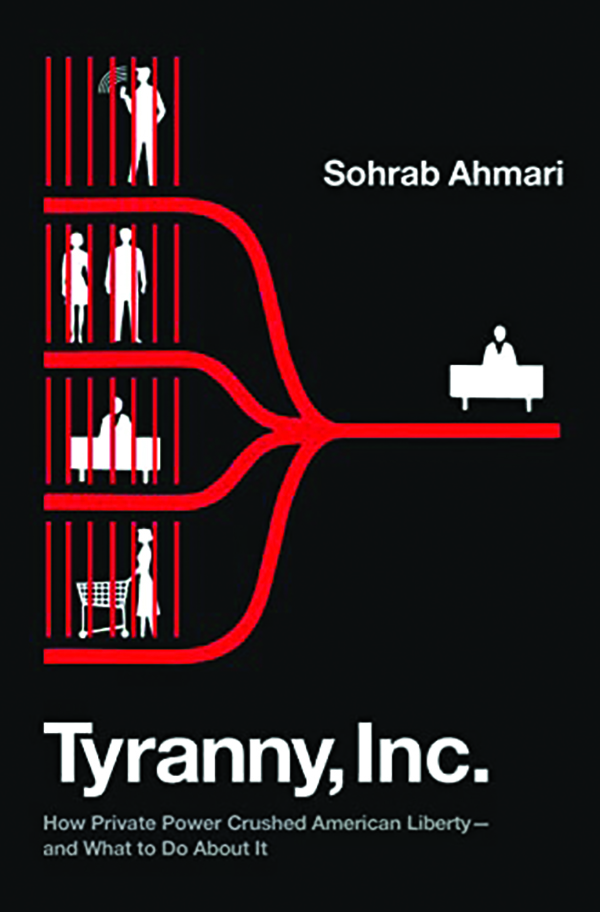
Sohrab Ahmari’s spiral around liberalism
Titus Techera
In the 21st century, American society and politics have shifted in a shocking way, leading almost to a reversal of the positions and electorates of our two parties. Democrats, once the party of the working classes and the unions, have rapidly become the party of the corporate, college-educated tech-savvy elite. Republicans, previously the party of business, have become the party of the poorer half of America that lacks college education and of journalists or intellectuals complaining about elite tyranny, online and offline, public and private. Liberals are now the establishment, conservatives the populists.

As with many big shifts, it goes unnoticed. We have no celebrated authors talking about how this has happened or what to do about it now. Nor are our parties, in Congress or elsewhere, any good at explaining what’s going on in America or even at representing their new electorate. Sohrab Ahmari’s new tract for the times, Tyranny, Inc., is therefore a very welcome contribution to a discussion of the new America we live in, but hardly pay attention to, and itself evidence of how quickly we have transformed as a society.
WHAT HARRY TRUMAN DIDN’T KNOW ABOUT THE NUCLEAR BOMB
Ahmari’s enemy, the tyrannical system of his title, is neoliberalism, which politically means Reagan and Thatcher. His hero (like Reagan’s) is FDR. And his guiding economist is Galbraith. (He dismisses or reviles Hayek.) A generation back, this would have made Ahmari a liberal Democrat, old-fashioned, midcentury, wishing America were more like Europe’s social democracy. Now it makes him something else, for which we don’t have a name, almost a prophet without a people.
Tyranny, Inc. is not practical. It’s a volume that appeals all the time to the authority of academics that all practical people despise or ignore. He might as well start every other paragraph with “studies show.” You can appease elites with this prose but not start a revolution.
Ahmari’s revolutionary hope is for a New New Deal, one that sticks. But the structure of his tract is conventional, built for the bestseller list. He starts by defining coercion in private life (in addition to the more familiar government coercion) and interpreting the activities of men in the marketplace as potentially despotic, unworthy of free citizens. Then, the first part, “The political economy of dystopia,” describes much of the economy as private tyranny in the form of a tour, chapter by chapter, of various industries and the various outrages that people suffer, preferably people who have a claim on our pity or charity regardless of the injustice they may suffer. Finally, the second part of Tyranny, Inc. offers a solution to private coercion, Galbraith’s “countervailing power,” which should allow workers, all of whom he’d like to see unionized, to stand up to capital.
Ahmari has three major practical complaints. First, bending the law to serve corporations when it comes to adjudication: Bankruptcy law, arbitration courts, NDAs, and any number of other changes to the working contract that workers feel compelled to accept. Next, the use of financial capital to destroy industries, especially journalism, but more broadly, corporate raiding. Finally, the privatization of public goods like emergency medical services or firefighters. Everywhere he looks in America, Ahmari sees the little guy get stiffed. Suffering is one half of the problem, perhaps the smaller half. Humiliation is the other. How can there be citizenship without equality before the law and the confidence that brings to all of us?
Ahmari has been a successful journalist and, if this is not an insult, a public intellectual most of his adult life. He has accordingly made a very public journey from atheism all the way to Catholicism, the subject of his recent memoir, From Fire, By Water, and a reflection on church wisdom, The Unbroken Thread. As best I can understand him, he is a man looking for a morality that can beautify life, that can overcome the cynicism and opportunism he decries in the case of corporate America. Catholicism is certainly the most beautiful form of Christianity but also the most democratic, which seems as important for Ahmari.
He talks about journalism in theological terms (chapter title: “Parched for truth”) as keeping power accountable to something higher than itself, a justice that has transcendent support. He wants truth-telling to protect the weak from becoming victims. A very Christian sentiment, to be sure, and inasmuch as it’s a matter of justice, a worthy pursuit. But is it a good explanation for the desire for fame and honor, for calling attention to oneself and demanding an authority over others? After all, Ahmari has been a public figure all his adult life and seems intent on keeping it up. Yet the universality of Christianity tends to rob every individual man or woman of great importance; we all matter, but no one of us especially. Writing, which has no authority and little influence in our lives, seems a Christian compromise between the demand of justice, which is practical, oriented to action, and the demand of greatness, which is to imagine oneself a ruler.
Ahmari makes it clear throughout his tract and especially in his last chapter, “In defense of politics,” that he wants to be practical. But if he wants to talk to and about the poorer half of America, the workers who suffer at the hands of the evil financial capitalists, he necessarily must become a Republican, which he might experience as a horrible fate. Yet more evidence that the transformations in our lives have not yet affected our thoughts. And if he wants to use the power of the state to improve the opportunities and proclaim the dignity of the working classes, he would have to look to Red America, to which millions and millions of people are moving in the hope of achieving exactly those things. Finally, Ahmari is a fervent Catholic convert. Again, if he wants to have any practical influence in America, or even maintain his self-respect, he must become as fervent a Republican, since liberals, Progressive, Democrats, etc. loudly and proudly despise, attack, and want to get rid of Christianity.
Ahmari is aware of all these transformations. His concluding remarks: “This book was conceived on election night 2020. The outcome was still murky, but one thing was clear: Republicans had widened their appeal among voters without college degrees and those doing tangible forms of labor. Democrats, meanwhile, had emerged as the party of Wall Street, Hollywood, Silicon Valley, and the professional classes.”
Yet he goes down the path of history and nostalgia, calling for a return to the American political arrangement of the New Deal and indeed a radicalization of it. His vehicle for it is the most implausible part of it all: “If there is hope to be found, I have come to believe, it lies mostly in ordinary workers, citizen-activists, and the labor organizers and lawyers who rally to their cause.” After complaining for the entirety of the book that workers are powerless, he turns to them to solve their problems. Were they able to, he would be wrong to complain about their plight.
I was persuaded by Ahmari’s insistence on the dignity and advantages of a political treatment of our problems (yes, let’s not leave our lives to our liberal managerial elites) but unpersuaded by his Galbraith economics and insulted by his contempt for Lincoln. I think most of the audience interested in change is unlikely to like Tyranny, Inc., and I regret it. We do need to talk about politics because we need to take political control of public and private institutions that seem hellbent on outlawing our beliefs, and we need to revive the economy. We don’t need “literary politics” and moralism but leaders and practical men. If Ahmari dedicated himself to serving as a union agitator or organizer to fulfill his dream rather than a magazine co-founder and the author of moralistic books, that would be more practical.
CLICK HERE TO READ MORE FROM THE WASHINGTON EXAMINER
Titus Techera is the executive director of the American Cinema Foundation and a cultural critic.
